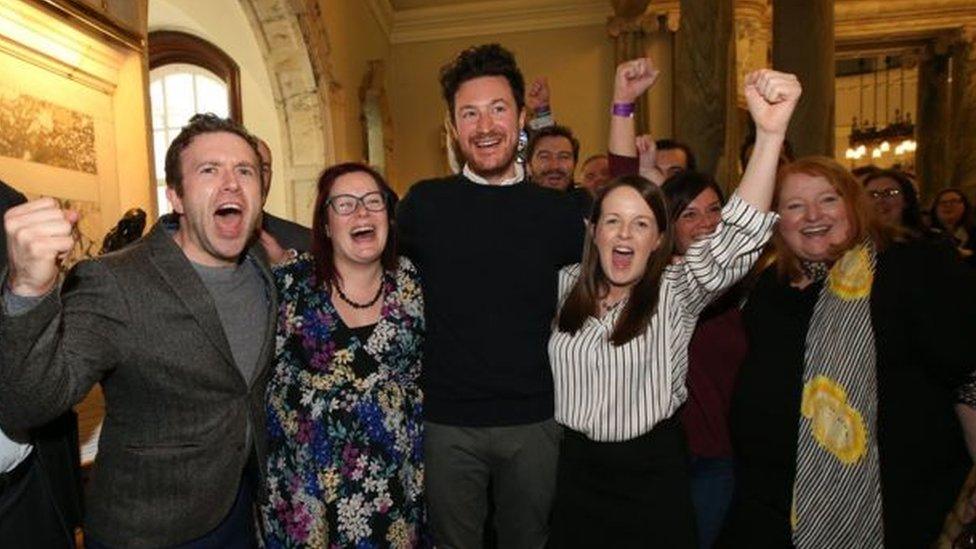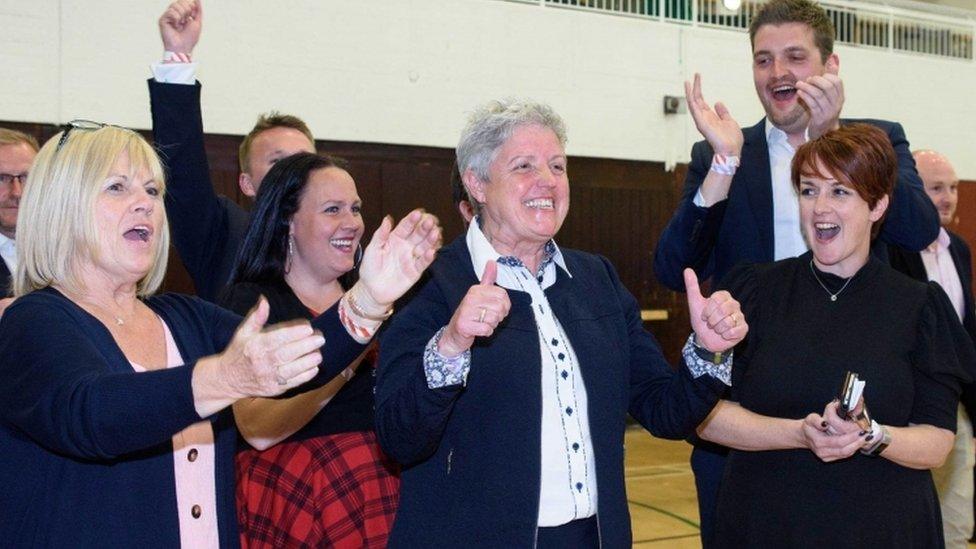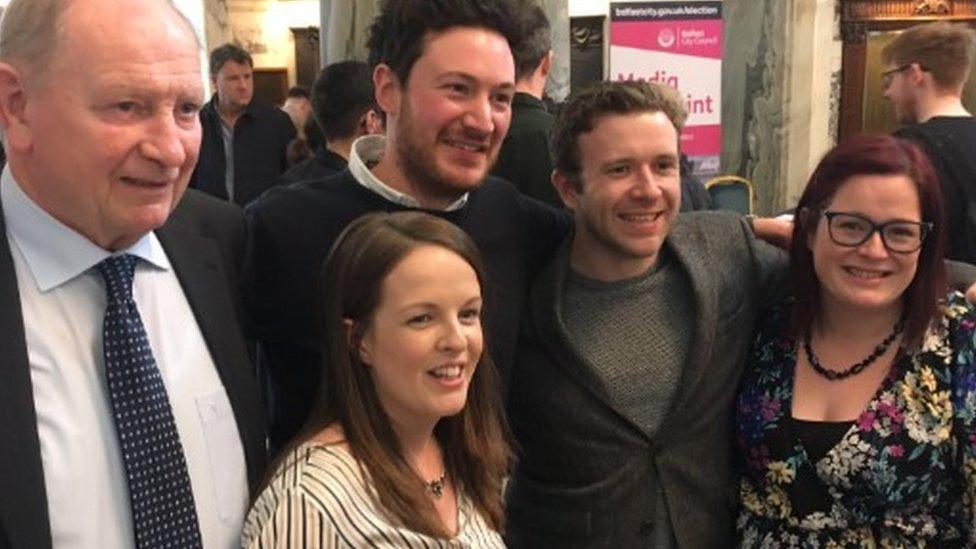Alliance surge in NI council elections a striking development
- Published

Alliance's Ross McMullan (centre) got almost 1,000 votes over the quota when he was elected to Belfast City Council
PR elections in Northern Ireland are always more of a marathon than a sprint, so it's wise not to overanalyse the results at the halfway mark.
The protracted drama of single transferable voting means that both candidates and parties who looked like hares early on turn into tortoises as the white tape approaches.
Conversely some early stragglers eventually crawl on their hands and knees towards the finishing line.
So with that caveat, where are we after day one of the count?
Alliance's surge is undeniably the most striking development.
So with inter-party talks due to get under way on Tuesday, what lessons might the party leaders be mulling over from the local council elections?
As day one of the count drew to a close the most striking development was the strong showing for Alliance.
At the halfway point their vote share was up by five percentage points, and they had broken out of their Greater Belfast heartlands by taking seats in places like the ABC council (Armagh, Banbridge & Craigavon) and Derry & Strabane where they previously had no representation.
What has fuelled the Alliance success?
Well since its inception in 1970 the party has stood for compromise between Orange and Green, so it seems plausible that the public's disenchantment with the paralysis at Stormont must have been an important factor.
Also on Brexit, Alliance reflects a widespread anxiety about the potential impact on the border and business.
With the parties due to resume talks next Tuesday, maybe the British and Irish governments could do worse than to re-read the Alliance blueprint "Next Steps Forward", external which suggested a variety of ways to break the deadlock including the appointment of an independent talks facilitator.
Alliance haven't been the only winners - the strong performances of Green and left wing People Before Profit candidates appear to indicate generational change.
And the election of the DUP's first openly gay candidate shows that times are changing, even within the party which used to be regarded as the political wing of Ian Paisley's Free Presbyterian Church.
The DUP leader Arlene Foster insists the party's policy opposing same-sex marriage remains unchanged.
But the maverick South Down MLA Jim Wells isn't the only DUP traditionalist unnerved by the election of Alison Bennington.
In private, other DUP figures think the leadership is testing the water as part of a process of incremental change.

Alison Bennington (centre, with thumbs up) celebrates her election to Antrim and Newtownabbey Borough Council
The draft deal which the DUP failed to sign off on in February of last year sidelined the issue of same sex marriage (something Sinn Féin took some criticism over).
But as the former Sinn Féin President Gerry Adams made clear in a blog published on polling day, external it will be back near the top of the talks agenda in the coming weeks.
The DUP seem fairly relaxed about their performance, with their vote share up and the Traditional Unionist Voice well down.
But both big parties will no doubt be annoyed that they have failed to take overall control of a single council.
On a good day, Sinn Féin might have hoped to seize either Fermanagh & Omagh or Derry & Strabane, whilst the DUP could have had a similar aspiration in Lisburn & Castlereagh.
In the event, none of these targets were hit.
Sinn Féin did make a breakthrough in Lisburn & Castlereagh, where they got two councillors in a chamber in which they were previously unrepresented.
But some of the party's other gambits failed to pay off - notably moving Patrice Hardy into Ballymena in the hope of inheriting some SDLP votes.
So far the Ulster Unionists look like the losers with a fall of two percentage points.
'Political dynasty'
That's partly because the former leader Mike Nesbitt had a successful council election five years ago, and under Robin Swann's leadership the party seems to lack firm direction, uncomfortably straddling a divide between its liberal and hardline unionists.
The SDLP has experienced problems, with breakaway councillors in some districts and arguments over its new link with Fianna Fáil.
However, it has proved resilient, especially in its Derry & Strabane home turf, with impressive debuts from Cara Hunter and Mary Durkan, who is keeping the family political dynasty going.
And last but not least we have a new kid on the block - the pro-life republican Aontú with its first councillor, recently retired GP Anne McCloskey, also in Derry & Strabane.
Day two and the political marathon continues.
The day after the counting stops, the real runners will take to the streets of Belfast for a real marathon.
It's the first time the race has taken place in the city on a Sunday, another reminder of how much the times have changed for those who still remember the days when some Northern Ireland councils used to tie up the swings in their play parks in the name of observing the Lord's Day.
- Published4 May 2019
